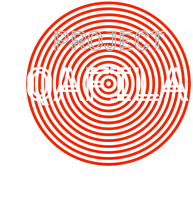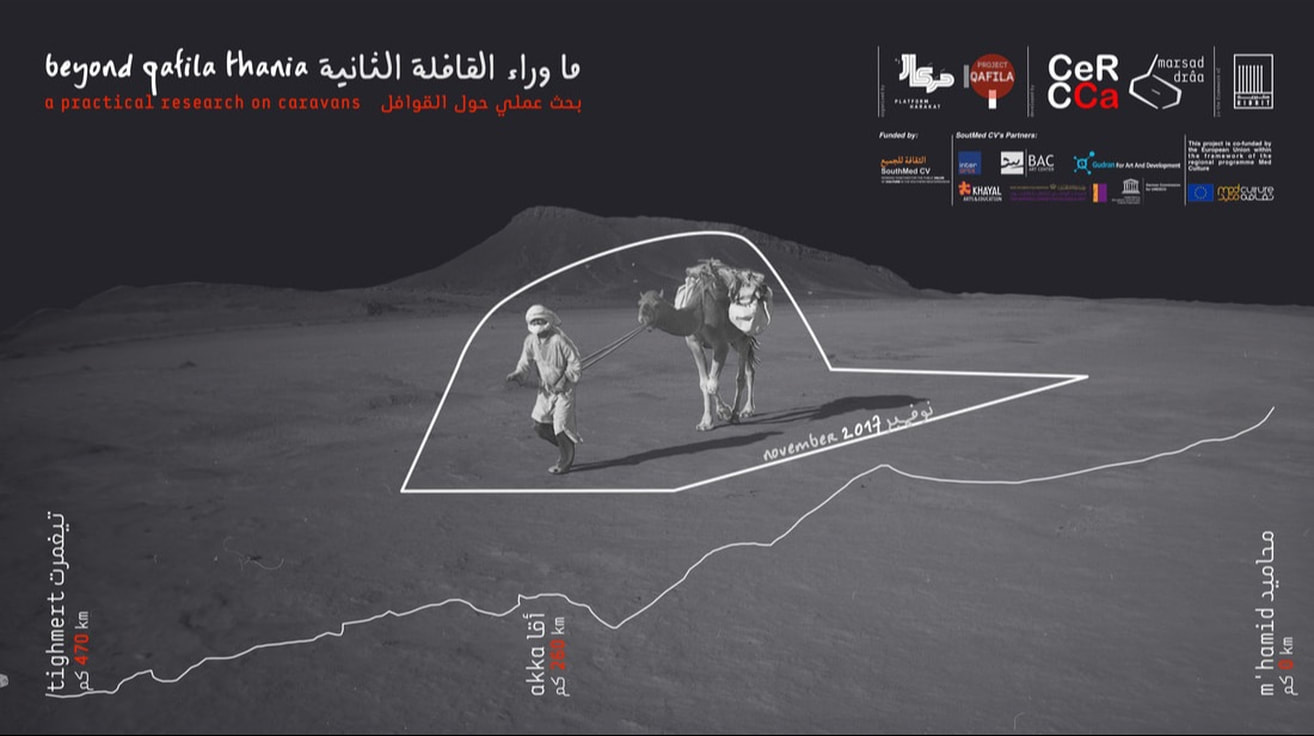Beyond Qafila Thania brings together researchers from Sudan, Morocco, Spain, Italy and the Netherlands researching in architecture, sociology and the visual arts actively approaching the cultural, social and geopolitical space of the Sahara desert. Tracing back the stories of the old caravans, learning about its influence in current day cultures and societies.
Beyond Qafila Thania facilitates an inspiring frame to exchange and research further on the participants on going projects focusing on topics such as contemporary nomad culture and architecture, current immigration routes, history of slave trade, race issues and trans-Saharan book trade and the mobility of Knowledges within the Mediterranean, Sahel and West Africa.
Beyond Qafila Thania develops through different stages:
- Research and archiving.
- Site visits: Departing from Marrakech to Agdz with research visits to different oases, kasbahs and ksars between Agdz and M’hamid El Ghizlane (22nd to 27th October 2017).
- Attendance at the Taragalte Festival, a gathering of musicians from the Saharan region, Morocco, Algeria, Mauritania, Mali and Niger (27th to 30th October 2017).
- A nomadic walking residency from M’hamid to Akka (30th October to 10th November 2017) and from Akka to Tighmert (11th to 23rd November)
- Beyond Qafila Thania Round table in Le18, Marrakech (13th November 2017)
- Presentation of the project as part of KIBRIT Final exhibition and publication event (15th December 2017).
The participant artists and researchers selected to be part of Beyond Qafila Thania are Amado Alfadni (Sudan), M’barek Bouhchichi (Morocco), Pau Cata (Catalonia), Carlos Perez (Spain) and Heidi Vogels (The Netherlands). For the first stage of the project they will be joined by Olì Bonzanigo (Italy), Laila Hida (Morocco), Francesca Masoero (Italy) and Leire Vergara (Spain).
Beyond Qafila Thania is a collaboration between CeRCCa and the Moroccan organizations Marsad Drâa through Platform HARAKAT, Project QAFILA and KIBRIT and is funded by SouthMed CV, a programme cofunded by the European Union within the framework of the regional programme MedCulture and the Departament de Cultura de la Generalitat de Catalunya. The logistic of the caravan was provided by Said Razgui.
Beyond Qafila Thania facilitates an inspiring frame to exchange and research further on the participants on going projects focusing on topics such as contemporary nomad culture and architecture, current immigration routes, history of slave trade, race issues and trans-Saharan book trade and the mobility of Knowledges within the Mediterranean, Sahel and West Africa.
Beyond Qafila Thania develops through different stages:
- Research and archiving.
- Site visits: Departing from Marrakech to Agdz with research visits to different oases, kasbahs and ksars between Agdz and M’hamid El Ghizlane (22nd to 27th October 2017).
- Attendance at the Taragalte Festival, a gathering of musicians from the Saharan region, Morocco, Algeria, Mauritania, Mali and Niger (27th to 30th October 2017).
- A nomadic walking residency from M’hamid to Akka (30th October to 10th November 2017) and from Akka to Tighmert (11th to 23rd November)
- Beyond Qafila Thania Round table in Le18, Marrakech (13th November 2017)
- Presentation of the project as part of KIBRIT Final exhibition and publication event (15th December 2017).
The participant artists and researchers selected to be part of Beyond Qafila Thania are Amado Alfadni (Sudan), M’barek Bouhchichi (Morocco), Pau Cata (Catalonia), Carlos Perez (Spain) and Heidi Vogels (The Netherlands). For the first stage of the project they will be joined by Olì Bonzanigo (Italy), Laila Hida (Morocco), Francesca Masoero (Italy) and Leire Vergara (Spain).
Beyond Qafila Thania is a collaboration between CeRCCa and the Moroccan organizations Marsad Drâa through Platform HARAKAT, Project QAFILA and KIBRIT and is funded by SouthMed CV, a programme cofunded by the European Union within the framework of the regional programme MedCulture and the Departament de Cultura de la Generalitat de Catalunya. The logistic of the caravan was provided by Said Razgui.


